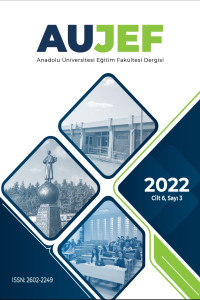A Lesson Practice Concept Including Student-Centered Approach for Foreign Language Teaching Departments
A Lesson Practice Concept Including Student-Centered Approach for Foreign Language Teaching Departments
We will handle a lesson practice including a student-centered approach in our paper. This practice (application), which improves both the traditional teacher attitudes and the ordinary position of students in class, constitutes an interactional lesson model. This model involves three stages: Pre-Lesson (before the class), Lesson (during the class) and Post- Lesson (after the class). All stages of practice are performed by both the teacher and the student. The student gets involved in the lesson plan and undertakes a responsibility by gaining awareness at the first stage. This strengthens the mutual reliance between the student and the teacher. Through this stage, which includes preparing a presentation by the student, the processes of internal motivation, investigation, reading and learning by himself/herself become active. Through the second stage; that is the lesson stage, the student motivates the whole class with his/her responsibility and motivation; increases his/her knowledge by teaching to the others and expresses himself/herself in a microsocial setting. At the third and final stage; that is the post-lesson stage, the student can evaluate himself/herself, which gives a feeling of self-confidence about how much he/she has learnt in this presentation, and a feeling of satisfaction about the activity, which will affect his/her grades at the end of the term.
Keywords:
Foreign language, student-centered, interactive, interactional concept,
___
- Demirel, Özcan (2003). Yabancı Dil Öğretimi, Ankara: Pegem/A Yayıncılık,.
- Elsner, Daniela & Wildemann, Anja (2013). Multi-literacies Entwickeln. Das europäische Projekt MUVIT (Multiliteracy Virtual). İstanbul Üniversitesi Hasan Ali Yücel Eğitim Fakültesi Dergisi, C. 10-1, Nisan 2013, S. 1-20.
- Heinz Klippert (2000). Methodenlernen – Übungsbausteine für den Unterricht. Weinheim, Basel, 11. Aufl., S. 27 – 31.
- Tekin, Halil (1979). Eğitimde Ölçme ve Değerlendirme, genişletilmiş 2. Basım, Ankara.
- Yılmaz, Hasan (2007). Yabancı Dil Öğretiminde Özgün Materyal. Gazi Üniversitesi Eğitim Fakültesi Türkiye’de Yabancı Dil Eğitimi Ulusal Kongresi, 2007, S. 842-846.
- Yücel, Erdinç (2011). Lernen durch Lehren: Eine handlungsorientierte Verfahrensweise für den DaF-Unterricht. Contemporary Online Language Education Journal, 2011, 2 (1), S. 22-32.
- “Bologna Süreci’ne Katılım için Gerekli Koşullar ve İşlemler”. https://bologna.yok.gov.tr/?page=yazi&i=52 (09.11.2013)
- “Bologna Süreci 2020 - Yeni On Yılda Avrupa Yükseköğretim Alanı - Avrupa Yükseköğretimden Sorumlu Bakanlar Konferansı Bildirgesi (Leuven ve Louvain-la-Neuve, 28-29 Nisan 2009)”. https://bologna.yok.gov.tr/?page=yazi&i=85; 09.11.2013)
- Picciano, Anthony G. (2002). Developing a Web-Based Course Model at an Urban University. Berufs- und Wirtschaftspädagogik Online. bwp@-Sonder-Ausgabe Nr. 2a (Juni 2002): Forschung und Entwicklung didaktischer Innovationen in-mit-durch webbasierte Lernumgebungen. http://www.bwpat.de/ausgabe2a/picciano_bwpat2a.shtml (09.11.2013)
- Riedl, Alfred & Schelten, Andreas (2006): Handlungsorientiertes Lernen. Aktuelle Entwicklungen aus der Lehr-Lern-Forschung und deren Anwendung im Unterricht. Unterlagen für die Teilnehmer der Fortbildung. Fortbildung für Lehrerinnen und Lehrer an beruflichen Schulen 14. Februar 2006. Technische Universität München. (http://www.bpaed.edu.tum.de/fileadmin/tueds02/www/pdfs/publikationen/riedl/2006lfhuriedlschelten.pdf) (15.04.2017)
- ISSN: 2602-2249
- Yayın Aralığı: Yılda 4 Sayı
- Başlangıç: 2017
- Yayıncı: Anadolu Üniversitesi
Sayıdaki Diğer Makaleler
Grimm Masallarındaki Cadı İmajı
Sosyolojik Açıdan Yeni Çağ Alman Edebiyatı
Zum Trauerspiel (Zriny) Von Theodor Körner
Gençlere Yönelik Almanca Ders Kitaplarında Metin Türleri ve İncelenmesi
Anastasia ŞENYILDIZ, Lena Katrin MERKLE
“Volkslied als sprachliches Kunstwerk”. Ein Sammelband zum Thema Volkslied
